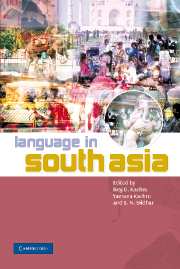Book contents
- Frontmatter
- Contents
- List of Figures
- List of Maps
- List of Tables
- Preface
- Acknowledgments
- List of Abbreviations
- Note on Transcription
- Introduction: languages, contexts, and constructs
- Part 1 Language history, families, and typology
- Part 2 Languages and their functions
- Part 3 Sanskrit and traditions of language study
- Part 4 Multilingualism, contact, and convergence
- Part 5 Orality, literacy, and writing systems
- 13 Orality and literacy
- 14 Writing systems of major and minor languages
- Part 6 Language conflicts
- Part 7 Language and modernization
- Part 8 Language and discourse
- Part 9 Language and identity
- Part 10 Languages in diaspora
- References
- Subject Index
- Language Index
- Author Index
13 - Orality and literacy
Published online by Cambridge University Press: 04 May 2010
- Frontmatter
- Contents
- List of Figures
- List of Maps
- List of Tables
- Preface
- Acknowledgments
- List of Abbreviations
- Note on Transcription
- Introduction: languages, contexts, and constructs
- Part 1 Language history, families, and typology
- Part 2 Languages and their functions
- Part 3 Sanskrit and traditions of language study
- Part 4 Multilingualism, contact, and convergence
- Part 5 Orality, literacy, and writing systems
- 13 Orality and literacy
- 14 Writing systems of major and minor languages
- Part 6 Language conflicts
- Part 7 Language and modernization
- Part 8 Language and discourse
- Part 9 Language and identity
- Part 10 Languages in diaspora
- References
- Subject Index
- Language Index
- Author Index
Summary
Introduction
If we focus our attention on the ways in which we constantly fine-tune our linguistic and cultural behavior in response to changes in interactional situations, we will immediately realize that multilinguality (and attendant multiplicity of cultures) must be, as it were, constitutive of an individual's identity and a community's intra- and intergroup dynamics. With the progress made both in the sociolinguistic analysis of variability and the sociology of language, the multilingual nature of several societies has been carefully documented. Even the myth of “one nation–one religion–one language” that had gained considerable supremacy during the colonial and post world-wars period was seriously questioned and it became obvious that the countries hitherto regarded as the ultimate examples of monolinguality such as the United States, the United Kingdom, and various European countries were essentially multilingual. Even when “a language” was associated with “a community,” it was obvious that the range of variability in terms of region, age, sex, and socioeconomic status was so substantial as to merit different linguistic labels. In fact, it is extremely difficult to define “language” and “community” with any clarity and precision; their definitions actually tend to be circular generally. Our multilinguality is of course built on a shared Universal Grammar that informs all linguistic behavior at some abstract level. We need this multilinguality not only to negotiate our day-to-day encounters that multiply exponentially in complexity as persons, places, and topics of conversation change, but also to construct, transmit, and continuously enrich our culture.
- Type
- Chapter
- Information
- Language in South Asia , pp. 271 - 284Publisher: Cambridge University PressPrint publication year: 2008
- 2
- Cited by



